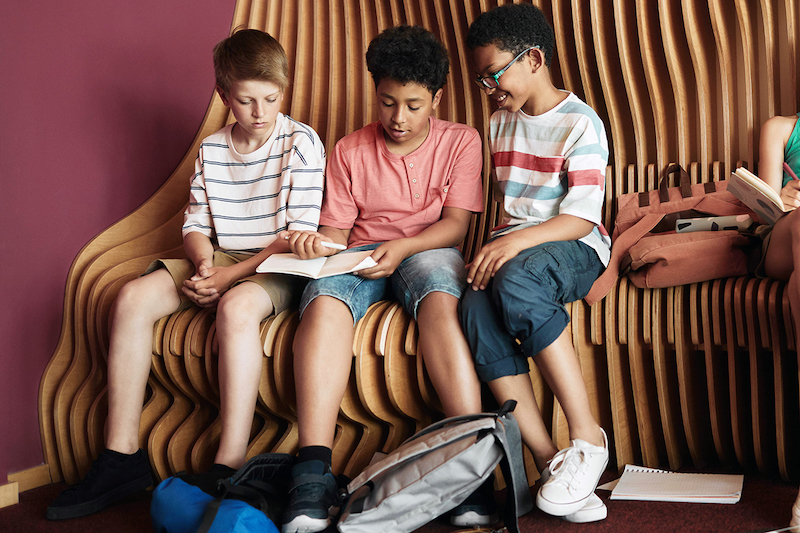American men are lonely. According to an American Enterprise Institute survey, 15% of men have no close friendships at all, a fivefold increase since 1990. In Equimundo’s 2023 State of American Men report, based on a survey of over 2,000 men, 44% reported having thoughts of suicide over the previous two weeks. The survey showed that young men aren’t immune to issues of isolation, with two-thirds of men ages 18 to 23 saying they felt that “no one really knows me.”
Here’s how Equimundo’s researchers framed their findings:
Men in the U.S. are in trouble. Many feel that their futures are uncertain and their identities are threatened. This situation is especially acute now, but this anxiety has always been built into boyhood and manhood. Told to “man up” or “be a real man,” boys and men who inevitably cannot meet the impossible overlapping standards of toughness, self-sufficiency, dominance, or stoicism have their very identity withheld from them.
These concerns are showing up as early as middle and high school, where an increasing number of boys are feeling lonely and isolated, underperforming in school and opting out of college, overdosing on drugs, falling under the spell of extremism, and engaging in lethal violence and self-harm — including mass shootings and suicide.
According to the Global Boyhood Initiative, at least 72% of young men in the U.S. say they’ve been told “a ‘real man’ behaves ‘a certain way,’” which involves being heterosexual, tough, and a risk-taker. Young men who embrace rigid masculine norms are five times as likely to bully (verbally, online, or physically) or sexually harass someone, and twice as likely to experience depression or suicidal ideation.

The popularity of Andrew Tate shows us that boys are looking for examples of how to be a man in the world. Tate knows how to use boys’ insecurities to build an audience. If we don’t proactively provide guidance and a place for boys to talk about masculinity, power, and success, they may latch onto the ideas of people like Tate, or look for advice in the posts of radical online extremists.
It can be scary to think about all the issues boys are struggling with today, but there are some powerful things parents and schools can do to intervene.
What can parents do?
If you have a young son, it may be useful to spend a few minutes thinking about his future. Imagine him at 25. At 30. At 40. At 50. What kind of relationships do you want him to have? How do you want him to treat people? How would you like to see him deal with conflict? How do you imagine him contributing to his community?
When I do this exercise, I get a pretty strong image in my head. I want my boys to become men who are connected to their feelings and are comfortable expressing a full range of emotions. I want them to be able to maintain supportive, caring relationships. I want them to have a sense of purpose in life, and to actively look for ways to help others.
Making that future a reality requires teaching some specific skills, and doing a lot of listening. Throughout the tween and teen years, parents need to do everything they can to stay engaged with their boys and keep the lines of communication open. When your son is talking, put your phone down, nod and ask clarifying questions, and don’t rush to fill awkward silences.
Learn about their world and their interests. Let them tell you about the songs, memes, games, and videos that have their attention. Try to stay curious rather than giving advice or passing judgment.
Establishing this rapport will make it easier to talk about more challenging topics, like sexual harassment, consent, or drug use. If you are having trouble introducing more substantive topics, try these conversation starters from the Global Boyhood Initiative or pick up a deck of “Cards For Masculinity” from Next Gen Men.
A promising approach in schools: boys’ groups
Boys are very influenced by the beliefs and behaviors of their peers in school, so it’s important that schools are actively working to support healthy masculinity. Schools are uniquely positioned to help boys develop deeper, more fulfilling friendships and become more comfortable and confident.
The good news is that one effective intervention — a well-run boys’ group — is relatively easy to implement and can make a tremendous difference. In a boys’ group, a social worker, teacher, psychologist, or other school staff member creates space for boys to share their feelings, connect with one another, and discuss what masculinity means to them. In the groups, boys are given space and permission to be emotionally vulnerable.
I’ve seen the transformative power of this kind of group personally. For the past decade, I’ve been coordinating the Young Men’s Health Groups program in San Francisco public schools. The program brings small groups of young men together for weekly sessions with a counselor, where they talk about masculinity, dating, gender roles, and sexuality.
Seeing the groups up close has taught me a lot about the value of giving young men a positive space to reflect on their lives and connect with one another. It turns out that middle school and high school boys are really interested in talking about masculinity and what it’s like to be a boy today, and, with a skilled facilitator, they will open up, be vulnerable, and make social connections.
There’s also evidence that the groups are having a positive effect. The results these groups produced were showcased by the CDC, which provided some initial funding to get them started. After participating in the groups, boys were much more likely to say that “adults at this school care about me,” “I respect people who have different sexual orientations than mine,” and “I know what it means to be in a healthy relationship.”
The data we have here is promising, but limited. It’s important that we continue to study the impact of these groups so we can make more informed decisions that help boys develop in healthy ways.
Do boys really need this much attention?
When interventions like boys’ groups are suggested to schools, people sometimes worry that addressing boys’ issues will take something away from girls and people of other gender identities.
That doesn’t have to be the case. We all want boys to feel happy, connected, and satisfied. We want them to have lots of options about how they live their lives and who they choose as friends and partners. We need to counter the overwhelming sexist, toxic messages about gender and relationships that hurt girls — and boys. All kids need this support.
“Gender equality is not a zero sum game,” explains Richard Reeves, president of the American Institute for Boys and Men. “We can do more for boys and men without doing less for women and girls. We can be passionate about women’s rights, and compassionate towards the struggles of boys and men. We rise together.”
Boys and men benefit greatly from having vulnerable, open, curious conversations about manhood and masculinity, and they carry those benefits forward into their schools, their jobs, their friendships, and their relationships. In other words, helping boys helps everyone.
What resources are available to learn more?
In my experience, schools often decide to try a boys’ group after a passionate student, parent, or teacher advocates for one. If you’re considering taking on this cause, it may be useful to review the available materials and curricula. Fortunately, several organizations have created free facilitation guides to help folks lead these types of groups. Here are a few solid examples:
- Live Respect from A Call to Men: This 12-session curriculum “offers coaches, educators, mentors, and youth advocates the tools to build young people of character. Data show that the curriculum significantly increases young people’s understanding of — and commitment to — gender equity and violence prevention.”
- Manhood 2.0 from Equimundo: This six-session curriculum is designed to “engage young men in gender equity, violence prevention, and creating healthier and more equitable relationships. The curriculum includes a series of sessions to enable young men to reflect and build collective support for making positive, healthy changes in their lives.”
- Next Gen Manual from Next Gen Men: This facilitation guide — six core sessions and seven optional extensions — is “about building boys who are empathetic, accountable and courageous advocates for gender equality who are able to develop supportive friendships, handle crises with resilience, and positively affect their communities.”
- Next Gen Men also runs the NGM Boys+ Club on Discord, “a safe space for masculine-exploring youth in Grades 7-9 to build connections with like-minded peers.”
Working with sports coaches may be another way to effectively reach boys:
- Futures Without Violence has an excellent program called Coaching Boys Into Men, an “evidence-based violence prevention program that trains and motivates high school coaches to teach their young male athletes in healthy relationship skills, mental health practices, and that violence never equals strength through 12 weekly discussions.” Here’s a powerful video about the program.
- TeamsOfMen works with coaches of boys’ sports teams to help them incorporate messages of support, ethics, respect, consent, violence prevention, and healthy masculinity. It’s promoted to coaches who “want to coach your players not just to scoreboard wins, but to personal growth.”
It can also be helpful to talk about these issues with other caring adults. Some great support options:
- Ruth Whippman, the author of BoyMom, hosts monthly masculinity discussion groups for her newsletter subscribers.
- Advocates for Young Men, developed by Ashanti Branch’s Ever Forward Club, provides both online discussion forums and live learning sessions.
- Next Gen Men hosts Inner Circle, an online forum where members share resources and lend support to one another.

















Log in
Thank you for this great article full of data and resources! I think these groups are amazing and would like to see more of them. I think the use of sports coaches is a powerful approach and I especially loved the quote by Richard Reeves of the American Institute for Boys and Men. Like so many other issues, supporting the needs of one group doesn’t need to be a zero sum game. I work with elementary aged children in scouting and look forward to using these resources to learn more about what I can be doing at younger ages to lay a strong foundation for both the girls and boys that I work with.
Honestly, I find it really annoying that the Boy Scouts started accepting girls. It was really good for my brother to have that one male-only activity during his middle school and high school years, and his scoutmaster was a great role model for him. Girl Scouts already exists and was already trans-inclusive. Girls in fact have a lot of possible single-gender outlets, but we keep making the ones for men co-ed.
I have a slightly different perspective as the mom of a young boy who recently became his Cub Scout leader. I’ve thought a lot about this question. I do support having a variety of affinity groups for adolescents, including girl-only and boy-only groups as long as they are inclusive, and I love the ones shared in this article. But I’m also relieved that Boys Scouts was changed to Scouting America and is slowly integrating girls and young women. I love that it has made it a more family-friendly activity since siblings can join together. For those without religious affiliations, I don’t think there are many activities that allow families to participate together and I think it’s good for children and communities. But I also think there were previously a lot of troubling messages about masculinity in some scouting groups. I’m so glad that your brother found a great role model in scouting but unfortunately that wasn’t always the case. We know that there was sexual abuse but there is also evidence of bullying and other problems including what the author here called “the impossible overlapping standards of toughness, self-sufficiency, dominance, or stoicism.” I’m happy about what integrating the BSA has done to the organization. For me, it’s not just letting girls/women in. It’s about the whole scouting community becoming more informed and inclusive, adopting new perspectives, and focusing on what really matters in their values/law. It’s not about being tough because it’s “manly”, it’s about being informed and prepared and knowing how to face challenges. I’m happy that my son is learning that those aren’t things “real men” do but things anyone can do. That being said, there are still boy-only troops and girl-only troops available and I believe it is going to stay that way.